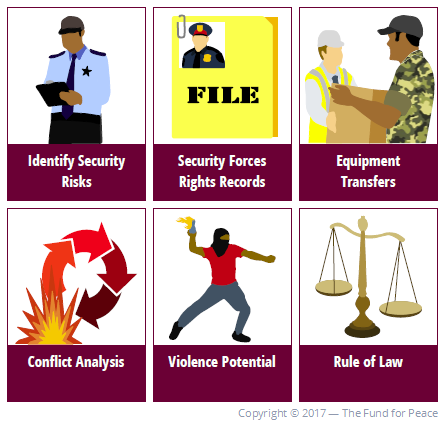Risk Assessments
 Risk assessments form the basis for properly informed, and thus appropriate, security arrangements to be put in place. These assessments involve identifying the risks in the company’s operating environment, including potential risks to its personnel and assets, and also risks to the local community. Good, well-informed risk assessments ensure that the deployment of security is appropriate to the level of security risk present, and as such reduce the risk of conflict or negative impacts.
Risk assessments form the basis for properly informed, and thus appropriate, security arrangements to be put in place. These assessments involve identifying the risks in the company’s operating environment, including potential risks to its personnel and assets, and also risks to the local community. Good, well-informed risk assessments ensure that the deployment of security is appropriate to the level of security risk present, and as such reduce the risk of conflict or negative impacts.

Focus Areas
Quality assessments should be timely, and regularly updated. The Voluntary Principles expect companies to perform regular risk assessments that focus on these key topic areas:
- Social issues;
- Political stability and governance;
- Economic concerns, including corruption and economic inequality;
- Law Enforcement and the trust that communities place in the role of police and/or the judicial system;
- Military activities and the trust that communities place in the role of the armed forces;
- Relationships between communities, community groups, authorities, and companies.

Key Factors to be Considered in Effective Risk Assessments
The VPs recommend that risk assessments take into account key factors that can potentially pose risks to a company’s operations and thus to the security situation:
- Identify Security Risks: Consider the security risks in the area, but remember to consider social, economic, and political concerns that may manifest themselves as security risks;
- Security Forces Rights Records: Obtain background information on the records of local Security Forces to be deployed to an area of operation to determine whether there is any history of abuse, and if so, to more closely address such issues when engaging with Security Forces;
- Equipment Transfers: Consider the risks related to providing payments or equipment to Security Forces, and the potential for misuse;
- Conflict Analysis: Understand the local “terrain” in regards to social, economic, political, or security concerns that could lead to conflict or instability;
- Potential for Violence: Given local concerns, consider the likelihood that any such tensions or grievances could lead to outbreaks of violence;
- Rule of Law: Consider the strength of rule of law, not only in how conflict or violence could be dealt with by the authorities, but whether abuses of government authority could lead to conflict and violence.

Information Sources for Risk Assessments
The Voluntary Principles recommend that updated, credible information be assembled from a broad range of perspectives, and this information should be shared among various stakeholders as much as possible:
- Local Government: Consult local authorities such as regional governments, municipal authorities, and village councils regarding past or present issues such as social tensions, conflict, or security concerns;
- Host Country Government: Consult with relevant ministries of the Ghanaian government;
- Multilaterals and Home Governments: Consult with multilateral institutions (such as the United Nations, ECOWAS, World Bank, African Development Bank) and, for foreign firms operating in Ghana, consult with the foreign ministry of the government of origin (such as the State Department for American companies);
- Civil Society: Consult with international and local Ghanaian civil society groups to understand their concerns on relevant social, economic, and security issues;
- Security Firms: Consult with knowledgable firms that have experise in security and conflict issues, including the company’s own Security Providers;
- Other Companies: Consult with other companies operating in the same environment.
